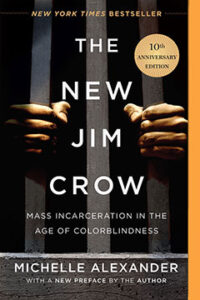 Thank you, Deborah Meier, for being able and willing to reveal your own racism! As Meier tells Diane Ravitch in the blog they write to each other and willingly share with the world:
Thank you, Deborah Meier, for being able and willing to reveal your own racism! As Meier tells Diane Ravitch in the blog they write to each other and willingly share with the world:
I think I have fallen into the trap, too, when pointing out that the white poor face many of the same obstacles that the black and Hispanic poor do. I, too, have been urging a more colorblind attack on our school system’s miseducational policies. Tactically, it might have seemed wise, but factually, it’s nonsense.
 Meier’s realization was prompted by Michelle Alexander’s book, The New Jim Crow, which describes how mass incarceration—disproportionately visited on people and, more specifically, men of color—has reproduced the infamous system of racial control in our supposedly “colorblind” era. As Alexander describes in painful detail, the injustices of that now-renounced system are revisited without remorse or question on “felons” who, due to their “crimes,” do not deserve the privileges of citizenship. Discrimination in employment, housing, voting, education, and public benefits becomes the unquestioned law of the land—just as Jim Crow became the law of the land not so long ago.
Meier’s realization was prompted by Michelle Alexander’s book, The New Jim Crow, which describes how mass incarceration—disproportionately visited on people and, more specifically, men of color—has reproduced the infamous system of racial control in our supposedly “colorblind” era. As Alexander describes in painful detail, the injustices of that now-renounced system are revisited without remorse or question on “felons” who, due to their “crimes,” do not deserve the privileges of citizenship. Discrimination in employment, housing, voting, education, and public benefits becomes the unquestioned law of the land—just as Jim Crow became the law of the land not so long ago.
When I first read the book last fall, I remember thinking about the various ways we justify and legitimize oppression. The myth of meritocracy allows us to perpetuate inequities in the name of justice and just desserts. As Meier alludes to, we see this as much in schools as we do in the justice system. Disproportionality in discipline is justified and legitimized by our belief in “bad” students of color who do not know how to behave. These same students are met at school doors with police officers and metal detectors that remind them daily of the system’s belief that they cannot be trusted. The “achievement gap” is rationalized as an outcome of failing students who do not care about their education and parents who do not care about (or do not know how to raise) their children rather than as a natural outgrowth of a racist system.
Meier ends her blog with this advice:
The manufactured school “crisis” we are living through may have much to learn from the “crime” and “drug” crisis that has built prisons instead of schools, torn fathers from children, and then blamed their mothers for not having husbands; given additional voting power and funding to the towns where they were imprisoned and less to the districts where their families lived; and on and on. We fell for that one—so we need to be sure we don’t fall for the “school crisis” as an excuse for separating black children from white children, treat disobedience in schools for black children as cause for exile and shame, and claim there is no space or funds for small class sizes because we are spending so much to control “unrest”—billions on policing and confining fellow Americans in prisons.
Meier is speaking her truth and that truth is the real crisis. So, if you haven’t read this book, please read it. If you haven’t considered the tenor and framing of the current educational crisis, please consider it. We are at a crossroads where we can martial our talents and skills to fully address the issue of racial discrimination in our systems of education, prison complex, and social institutions, or we can continue to perpetuate the same injustices and cry, “We’ve done what we can,” when really we haven’t.
